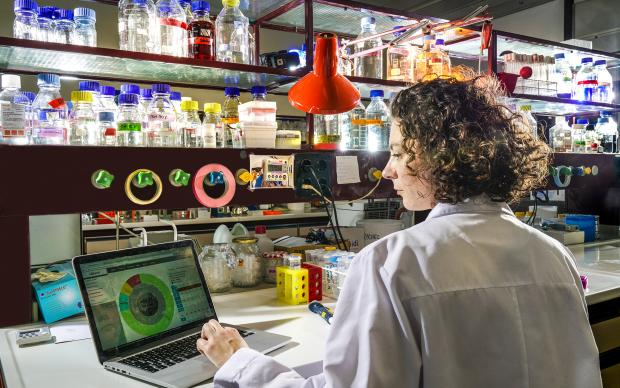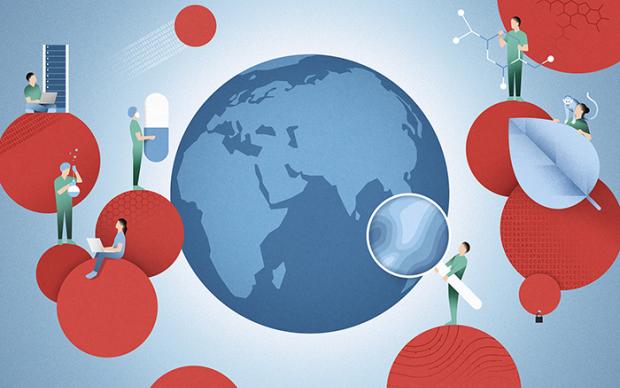A recent high-level science briefing in Brussels positioned SIB and other research infrastructures as key drivers of competitiveness in Europe and beyond. As a panelist, Executive Director Christophe Dessimoz highlighted how SIB’s software tools and knowledgebases are contributing to innovation and economic growth and addressing AI challenges. The event was organized by the Mission of Switzerland to the EU, the Paul Scherrer Institute, the European Molecular Biology Laboratory and SwissCore.
The European Commission defines research infrastructures as “facilities that provide resources and services to research communities to conduct research and foster innovation in their fields”. These include high-quality datasets, computational tools and data science training—which are among SIB’s core competencies.
Providing data, tools, and expertise for industry
SIB and other research infrastructures (RIs) are increasingly recognized for advancing basic and applied science that drives economic competitiveness.
The European Commission defines research infrastructures as “facilities that provide resources and services to research communities to conduct research and foster innovation in their fields”. These include high-quality datasets, computational tools and data science training—which are among SIB’s core competencies.
The best-known example is the transfer of data and new research to start-ups, industrial value chains and market-based solutions—as reflected by the thousands of mentions of RI-generated resources in company patents globally.
During the panel session, Christophe Dessimoz explained that RIs additionally contribute to innovation by:
- providing open data and open-source software that allow researchers in companies to experiment with quality data and code with minimal hurdles
- customizing data resources for industrial applications
- acting as neutral facilitators in pre-competitive spaces, such as brokering the adoption of standards that benefit all players
- bridging cultural differences between academia and industry to ensure effective knowledge transfer
The panelists also discussed how collaboration frameworks help enable such public-private partnerships. The Innovative Health Initiative (IHI) and the European Innovation Council (EIC), for example, can align RI resources with market-driven goals and incentivize pre-competitive partnerships and innovation. The EIC portal, where SIB lists its services, also helps make companies more aware of what RIs have to offer to boost their competitive advantage.
Discover SIB’s services for academic, clinical and industry partners
Enabling AI competitiveness
One increasingly relevant RI contribution to innovation is their provision of high-quality databases and tools that help train and benchmark artificial intelligence (AI) models.
Two recent examples are AlphaFold and RoseTTAFold, whose developers shared the 2024 Nobel Prize in Chemistry. Both rely on freely available biodata resources, including three co-developed by SIB Groups and Members: UniProt, the world’s leading protein sequence database; CAMEO, a software tool for benchmarking protein structure modelling; and CASP, a protein-structure prediction contest.
Generating value through data sharing
The event emphasized the need for open data and the increasing interest of policy makers in data sovereignty. At SIB, we believe these concepts are not mutually exclusive. While countries need secure access to data, data hoarding can be counterproductive as the full value of data often comes from their aggregation and integration. Moreover, data sharing can be a strategic advantage by building trust, securing reciprocal partnerships and establishing national standards as the international de-facto.
Data sovereignty is traditionally understood as the control over data produced within a country. We propose to broaden this definition by including the ability to set ground rules for data sharing and quality standards, and position our country as a trusted partner in the global data ecosystem.
Securing the future of European competitiveness
Titled ‘The role of research infrastructures for competitiveness in the age of AI’, the science briefing was a timely reminder in light of discussions towards the EU’s next Framework Programme for Research and Innovation (FP10) and the European Research and Innovation Area (ERA) Agenda 2025-2027. As pointed out during the event, a large proportion of core global biodata resources are European and Swiss—and both the EU and Switzerland share a highly regarded value of quality. Despite this, funding for European RIs remains an ongoing issue.
The briefing was held on 11 December and brought together European Commission and national representatives, European stakeholder organizations, RI representatives and the scientific community. Christophe Dessimoz participated in a panel session on ‘The contribution of research infrastructures to European competitiveness’ along with:
- Mirjam van Daalen, Head of Communications, Paul Scherrer Institute (PSI, part of the ETH Domain in Switzerland)
- Plamena Markova, Chief of International Relations, European Molecular Biology Laboratory (EMBL)
- Iason Dougenis, Policy Officer for Research Infrastructures, Directorate-General for Research and Innovation (DG RTD), European Commission
Reference(s)
Image credit: Mission of Switzerland to the EU











